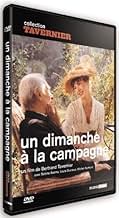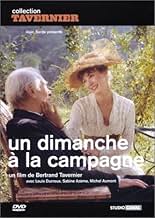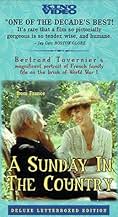Un dimanche à la campagne
- 1984
- Tous publics
- 1h 30m
IMDb RATING
7.4/10
3.4K
YOUR RATING
An elderly painter whose son visits with his family on the weekends, is also surprised by a visit from his still-single daughter.An elderly painter whose son visits with his family on the weekends, is also surprised by a visit from his still-single daughter.An elderly painter whose son visits with his family on the weekends, is also surprised by a visit from his still-single daughter.
- Director
- Writers
- Stars
- Nominated for 1 BAFTA Award
- 13 wins & 12 nominations total
Sabine Azéma
- Irène
- (as Sabine Azema)
Geneviève Mnich
- Marie-Thérèse
- (as Genevieve Mnich)
- Director
- Writers
- All cast & crew
- Production, box office & more at IMDbPro
Featured reviews
In early 20th century France, an impressionist painter is visited at his country estate by his grown children. This is a very low-key film where nothing much happens but where one experiences the satisfaction of having spent a Sunday afternoon in the country engaged in conversation with intelligent people. Ducreux is excellent as the patriarch nearing the end of his life who relishes the visit from his dutiful son and free-spirited daughter, but is overcome with feelings of nostalgia and perhaps regret. The cinematography is gorgeous, with images suggesting impressionist paintings. The soundtrack appropriately consists of chamber music, that of Faure.
Not much happens during "A Sunday in the Country", which depicts what the title suggests: a well-to-do French family having a Sunday gathering during what appears to be the 1920s - it is the world of Marcel Proust, only a few decades later. This presents more of a family portrait and character revelation piece than a plotted story. We get to know the main characters and their relationships - the genteel old father dotes on his exciting daughter and is critical of his dour, proper son. He is dependent on the crabby housekeeper who rules the home. It is a mellow, fine-looking film, sprinkled with comments on impending death and art. Sabine Azema steals the show as the charming but flaky Irene.
In pre-WWI France Monsieur Ladmiral prepares for the day in his large country house near Paris. It is Sunday, the day his son Gonzague and family frequently visit him. Gonzague arrives by train with his wife and three children - two young sons and a daughter. Monsieur Ladmiral walks to the station to meet them. Well actually he only makes it about half way there when he meets the family walking toward his house. Thus we are introduced to one of the themes - how Ladmiral deals with getting older (in this case by denying that he can't walk as fast as he used to).
On this particular Sunday Ladmiral is also treated to a rare visit by his daughter Irène. She arrives by car and her breezy, outgoing personality dominates. The children take to her, but the reactions of the rest of the family are much more complex. Gonzague has been the dutiful son who has done what was expected of him while Irène is clearly a bit of a free spirit. But equally as clear is that Ladmiral favors his daughter for her determination to live life on her own terms and is disappointed that his son has not been more aggressive.
It is amazing how much we come to understand the dynamics of this family from observing them during this one day. Typical of the hints we get is Gonzague's comment, in response to the excitement over Irène's car, that "I had children and not a car." By the end you feel that you can extrapolate backward in time to the essential history of this family.
Particularly poignant are the musing of the old man himself. He has been a painter of some repute and respect, but feels perhaps that he took too modest a path in his work, that he could have been more experimental and made more significant contributions. Is he wishing that he had been more like Irène than Gonzague, and that is why he fancies his daughter?
The pacing is slow and the filming is lush. You are left with a certain wistfulness. This may evoke memories to visits to your own grandparents.
The focus in on the personalities and the undercurrents of conflicted feelings that exist in all families.
On this particular Sunday Ladmiral is also treated to a rare visit by his daughter Irène. She arrives by car and her breezy, outgoing personality dominates. The children take to her, but the reactions of the rest of the family are much more complex. Gonzague has been the dutiful son who has done what was expected of him while Irène is clearly a bit of a free spirit. But equally as clear is that Ladmiral favors his daughter for her determination to live life on her own terms and is disappointed that his son has not been more aggressive.
It is amazing how much we come to understand the dynamics of this family from observing them during this one day. Typical of the hints we get is Gonzague's comment, in response to the excitement over Irène's car, that "I had children and not a car." By the end you feel that you can extrapolate backward in time to the essential history of this family.
Particularly poignant are the musing of the old man himself. He has been a painter of some repute and respect, but feels perhaps that he took too modest a path in his work, that he could have been more experimental and made more significant contributions. Is he wishing that he had been more like Irène than Gonzague, and that is why he fancies his daughter?
The pacing is slow and the filming is lush. You are left with a certain wistfulness. This may evoke memories to visits to your own grandparents.
The focus in on the personalities and the undercurrents of conflicted feelings that exist in all families.
I think this film can be appreciated on several levels. For some viewers, this is just a happy family portrait, reflecting a more peaceful time and recalling one's own memories of family outings and quiet Sunday afternoons. I think this point of view is mistaken, but I can see why people feel this way. The film is externally slow- moving and peaceful, like a sunny river. But like a river, there are strong currents lurking, invisible, under the surface -- currents that cannot be seen, but only observed indirectly from their effects.
There's a lot more going on here than just ninety minutes of bucolic peacefulness. Pay attention to the details, the small looks and gestures, the things said and things left unsaid. You can almost see the fine strands that link the characters, like a spiderweb, where each character's movements are felt by all the others. The role of the narrator, often disparaged in film, is used effectively here, giving the film a somewhat novel-like quality and reminding the viewer of their presence as an observer.
There's more to be said about this film, but I don't feel quite up to it. In any case, the real meaning of the film can't easily be described in words -- which is a good thing, or the film would be unnecessary. So watch the film yourself, if you haven't already, and see what you think.
There's a lot more going on here than just ninety minutes of bucolic peacefulness. Pay attention to the details, the small looks and gestures, the things said and things left unsaid. You can almost see the fine strands that link the characters, like a spiderweb, where each character's movements are felt by all the others. The role of the narrator, often disparaged in film, is used effectively here, giving the film a somewhat novel-like quality and reminding the viewer of their presence as an observer.
There's more to be said about this film, but I don't feel quite up to it. In any case, the real meaning of the film can't easily be described in words -- which is a good thing, or the film would be unnecessary. So watch the film yourself, if you haven't already, and see what you think.
I saw this film sixteen years ago, at a time when I did not see many 'filmhouse' movies yet. It made a strong impression on me, I wasn't used to so many 'open spaces' in films, which spectators have to fill according to their own ideas. Later I understood that once you start filling these 'holes' with pieces of yourself, the film becomes much more personal.
From time to time I think back to this film, like I did just now when I looked it up in the IMDB. Its storytelling, or rather story-hinting, is apparently so strong that even after sixteen years I am looking for some answers to the questions that the film raises.
In short: go see it.
From time to time I think back to this film, like I did just now when I looked it up in the IMDB. Its storytelling, or rather story-hinting, is apparently so strong that even after sixteen years I am looking for some answers to the questions that the film raises.
In short: go see it.
Did you know
- TriviaThe film is included on Roger Ebert's "Great Movies" list.
- GoofsIrene's flower in her bodice disappears and then reappears.
- SoundtracksQuintette pour piano et cordes Op. 115
Written by Gabriel Fauré
Performed by Le quatuor Via Nova, Jean Hubeau piano solo
- How long is A Sunday in the Country?Powered by Alexa
Details
- Release date
- Country of origin
- Language
- Also known as
- A Sunday in the Country
- Filming locations
- Château du Grand Saint-Léger, Villers-en Arthies, Val-d'Oise, France(house and garden)
- Production companies
- See more company credits at IMDbPro
Box office
- Gross US & Canada
- $2,411,143
- Gross worldwide
- $2,411,143
Contribute to this page
Suggest an edit or add missing content














